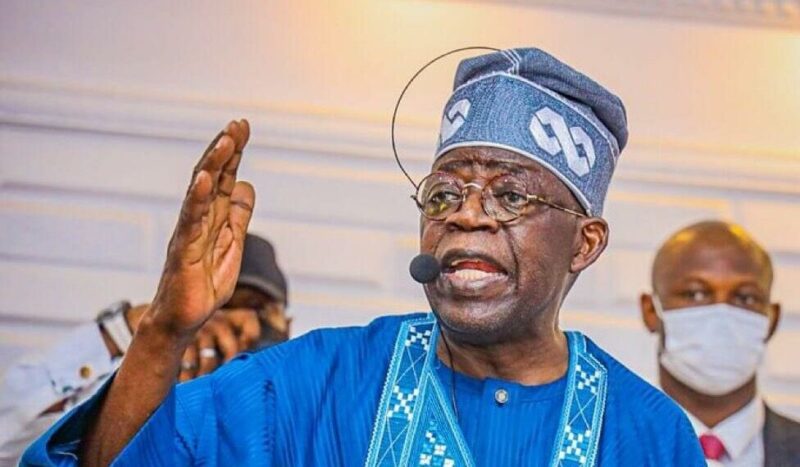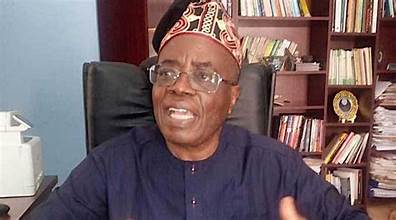Democracy & Governance
Urging Tinubu To Kill Corruption Before It Kills The Economy And Nigerians -By Isaac Asabor
Tinubu has promised to kill corruption, particularly as he described it as one of the main goals of his administration, and on that note rightly solicited for the cooperation of all Nigerians to achieve this lofty ideal. According to him, “My own is not identity politics. It’s not hunger or poverty politics. I have followed a man who has integrity, character and courage to say ‘Nigerians we need to change and change we have to. Change our mindset, kill corruption in our society.”

There is no denying the fact that the fight against corruption has from one political dispensation to another remained a topic of relevance for Nigerians, the government and its anti-corruption agencies and security personnel, as intolerance and aversion for it have continued to be deep-rooted.
Without a doubt, corruption has remained a major hindrance to Nigeria’s development, despite efforts made by successive regimes to combat it. In the absence of institutionalized anti-corruption agencies during military rule, military decrees were used in the fight against corruption. However, the return to civil rule in Nigeria in 1999 has ushered in a new chapter as the National Assembly constitutionally and legally backed the establishment of anti-corruption agencies.
For instance, upon assumption of office in 1999, former President Olusegun Obasanjo moved to combat corruption in line with international standards as his administration established the Independent Corrupt Practices and Other Related Offences Commission (ICPC) in 2000 and subsequently the Economic and Financial Crimes Commission (EFCC) in 2004.
Despite progress been recorded collectively by both agencies, it is germane to opine in this context that the anti-corruption crusade in Nigeria is plagued with a number of obstacles which undermines the effectiveness and efficacy of the agencies.
Given the foregoing actuality, not a few Nigerians are brooding over the trajectory which President Bola Ahmed Tinubu’s fight against corruption is following. The reason for their rumination cannot be farfetched as people are whispering in hush-hush tones amidst the allegation that the arrests of Emefiele and Bawa were politically stirred, particularly in the case of Emefiele who is widely known to been victimized as a result of his pragmatic move phase out the old naira notes with new notes ostensibly to prevent Tinubu from bribing the electorates during the immediate past presidential election in which he participated in.
The reason for the foregoing seeming conspiracy theory cannot be farfetched as Tinubu few days after assuming office on Monday, May 29, 2023, went after the now suspended Mr. Godwin Ifeanyi Emefiele, and in a similar vein suspended Abdulrasheed Bawa as chairman of the EFCC over some hazy allegations.
In fact, since the duo were respectively suspended and detained, not a few Nigerians are alleging that Tinubu’s fight against corruption is taking a new dimension, particularly as a school of thought has it that they were been politically victimized.
Without resorting to campaign of calumny, not a few Nigerians are worried that the fight against corruption embarked on by President Tinubu can best be said to be selectively implemented. Particularly as some of the politicians in his government, and considered to be close friends are not been prosecuted even as some of them were cleared and ostensibly exonerated for political appointments.
Given the foregoing perceived injustice and unfairness, there is the widely-held opinion that the ongoing that couldn’t have been happening under Tinubu’s watchful eyes as he is reputed to be averse to such oppressive and undemocratic conducts. Worrisome enough is the fight against corruption in this context is not been fought with modicum of objectivity and driven by clear evidence that can pass muster in court.
To this end, it expedient to urge the President to ensure that those facing corruption-related charges under his administration, particularly Emefiele and Bawa, are given fair trials and, if found guilty, should be convicted within the prism of extant laws.
In fact, President Bola Tinubu should strive as much as possible to ensure that the issue of the fight against corruption is not personalized. The reason for the foregoing advice cannot be farfetched as not a few people are conjecturing that Tinubu should not personalize and weaponize the war on corruption against his political opponents and the people he does not like, as by refraining from such act, he would be protecting the corrupt who are his political allies.
Rather, he is being encouraged to revitalize the fight against corruption by operationalizing institution involved in the fight against graft, and ensuring autonomy when it comes to funding.
Not only that, the barometer of public opinion is of the view that the president should ensure that the judiciary is clearly separated from the executive. The people are unarguably unanimous in their views that the closeness between the judiciary and the executive in his administration is too close for comfort. Happenings that characterize the recent screening of ministers clearly buttresses the fact.
Given the foregoing, it is expedient to remind Mr. President that he has for the umpteenth time assured Nigerians who are directly bearing the brunt of corruption and the international communities who may be willing to invest in the country that he will kill corruption.
In fact, Tinubu has promised to kill corruption, particularly as he described it as one of the main goals of his administration, and on that note rightly solicited for the cooperation of all Nigerians to achieve this lofty ideal. According to him, “My own is not identity politics. It’s not hunger or poverty politics. I have followed a man who has integrity, character and courage to say ‘Nigerians we need to change and change we have to. Change our mindset, kill corruption in our society.”
While applauding the President for his resolve to ‘kill corruption,’ it is expedient to remind him that he has at different times pledged to kill the menace, especially at different electioneering events that preceded the last presidential election in which he participated in. Again, it is equally expedient to urge him not to toe the footsteps of his predecessor, former president Muhammadu Buhari who made the same pledge in 2015 before he was elected. Not only that, their party, the All Progressives Congress (APC) made a singsong of their capacity to kill corruption. One of them said: ‘If Nigeria doesn’t kill corruption, corruption will kill Nigeria,’’ even as Buhari was touted to be a man of integrity, and Nigerians were promised that under his watch, corruption would become a thing of the past. Unfortunately, corruption has not being killed.
Despite promises made by the immediate past president that corruption would be killed, it is literarily expedient to say that it has not being killed, and that it now walks in and out of virtually all the Ministries, Departments and Agencies (MDA) under the management of the Federal and State governments so much that it would be okay if Tinubu can kill it as promised.










